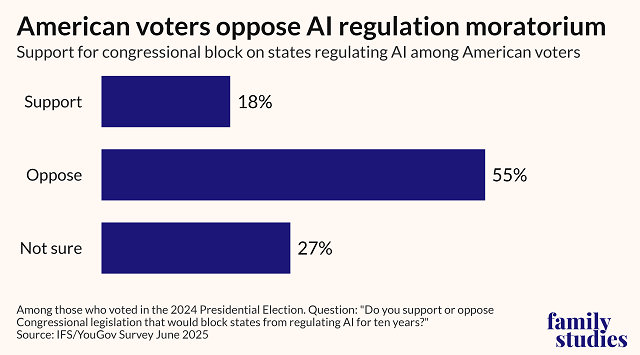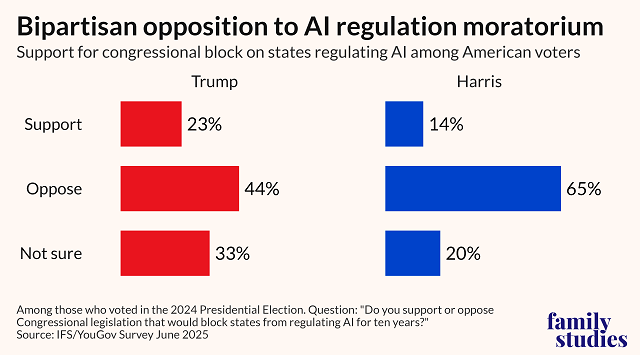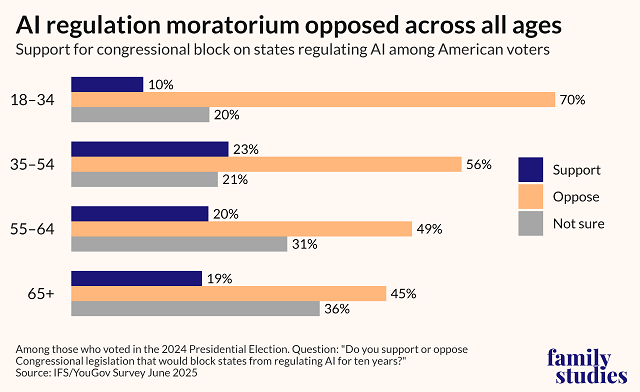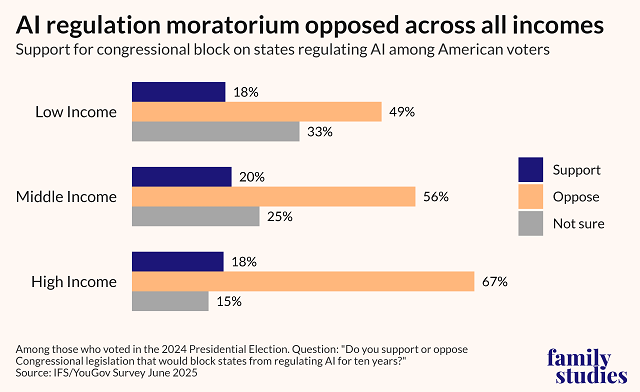Americans Oppose the AI Regulation Moratorium by a 3-to-1 Margin
June 25, 2025(CHARLOTTESVILLE, VA)--FOR IMMEDIATE RELEASE
CONTACT CHRIS BULLIVANT
A New Survey on How Americans Feel About Congress’s AI Moratorium
In a new survey by the Institute for Family Studies, we find that Americans oppose Congress’s AI regulation moratorium by a 3-to-1 margin. Opposition is bipartisan, across age groups, and across the income spectrum.
When the One Big Beautiful Bill Act passed the House on May 22, 2025, Americans were unaware that it contained a provision that would block and void state regulation of artificial intelligence (AI) for ten years, i.e., the so-called AI moratorium. The current version of the bill allows states the “choice” to regulate AI, but on the pain of forfeiting access to federal funding for broadband, as well as funding for AI implementation.
In a recent survey with YouGov, the Institute for Family Studies polled 763 Americans that voted in 2024 on whether they support the AI moratorium or not.
The majority of American voters oppose the AI moratorium by a margin of 3 to 1.
55% oppose the provision, versus 18% who support, and 27% who are unsure. Indeed, the most popular response was “strongly oppose” at 36% of voters, followed by “not sure” (27%), “somewhat oppose” (19%), “somewhat support” (11%), and “strongly support” (7%). In other words, strong support is the most unpopular position of all.

Opposition to the moratorium is bipartisan.
Opposition is strong among those who voted for Trump and those who voted for Harris in the last presidential election. 44% of Trump voters oppose the moratorium, while support is stronger for Harris voters at 65%.

Younger voters are the most opposed to the AI regulation moratorium, but opposition is strong across all age groups. Ages 18-34, 35-54, 55-64, and 65+ see more voters oppose the AI moratorium than support it, with younger Americans being the most opposed. 70% of 18–34-year-old voters oppose the moratorium. 45% of those aged over 65 oppose.

The moratorium is unpopular across all income brackets. Only 18% to 20% support the position across all income brackets. Lower income American voters were more likely to be “not sure.” Opposition is strongest among middle-income (56%) and high-income American voters (67%).

Conclusion
The data find that Americans strongly oppose the AI moratorium provision. The opposition is strikingly uniform.
Survey in full: Michael Toscano, Grant Bailey, “Americans Oppose the AI Regulation Moratorium by a 3-to-1 Margin,” Family Studies, June 25, 2025
NOTES
Authors: Michael Toscano is Senior Fellow and Director of the Family First Technology Initiative at the Institute for Family Studies. Grant Bailey is Research Associate at the Institute for Family Studies.
The Institute for Family Studies is a think tank that researches marriage, family life, and the welfare of children. It is a 501(c)(3) registered non-profit organization based in Charlottesville, VA.
On June 18, 2025, YouGov and the Institute for Family Studies fielded a survey of a nationally-representative sample of 2024 voters (n= 763) that asks the following question:
Do you support or oppose Congressional legislation that would block states from regulating AI for ten years?
Strongly support
Somewhat support
Somewhat oppose
Strongly oppose
Not sure
Low-income is defined as a family income of less than $50,000. Middle-income is defined as a family income greater than or equal to $50,000 and less than $120,000. High-income is defined as family income of greater than or equal to $120,000.















